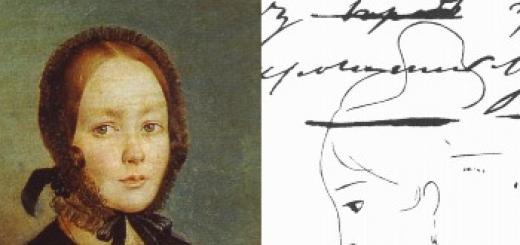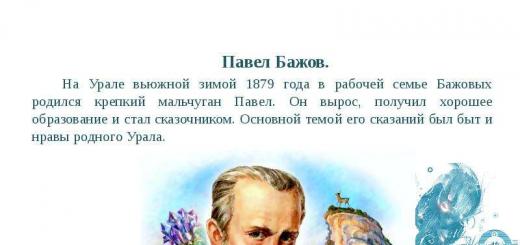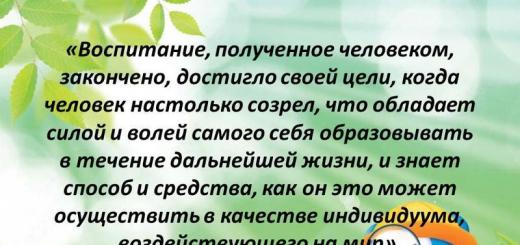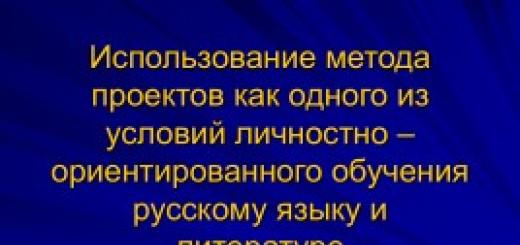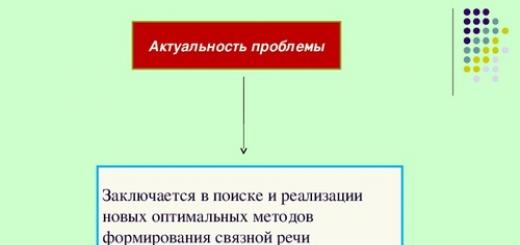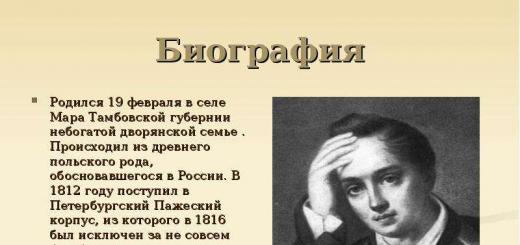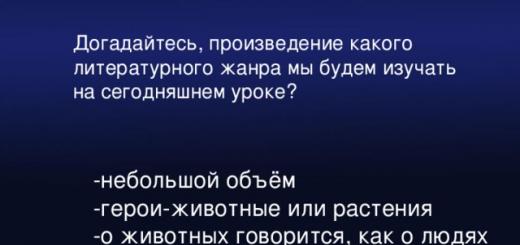The fate of I. Kant's philosophy in Russia has always aroused significant historical and philosophical interest. This is due, of course, first of all, to the importance of I. Kant for philosophy. He carried out a coup equal in scale to the Great French Revolution. I. Kant himself compared it with the Copernican revolution in astronomy.
Russian philosophers fully appreciated both the depth and the very nature of I. Kant’s “philosophical feat”. A deep thinker and an excellent expert on the history of philosophy, Professor of Moscow University P.D. In this regard, Yurkevich noted that in the question of the beginnings and essence of science, “the entire history of philosophy is divided into two unequal eras, of which the first is discovered by Plato, and the second by Kant.” Developing this idea, V.S. Soloviev began his article on Kant, written for the “Encyclopedic Dictionary” of Brockhaus and Efron, with these words: “Kant (Immanuel Kant, originally Cant) is the founder of philosophical criticism, representing the main turning point in the history of human thought, so the entire development of philosophy, if not according to content, then in relation to thought to this content, it should be divided into two periods: pre-critical (or pre-Kantian) and post-critical (or post-Kantian).”
In 1910–1911, P. Florensky gave a course of lectures under the general title: “Kant’s philosophy in connection with the philosophy that preceded it and the philosophy that followed.” But does this mean that the entire development of Russian philosophy subsequently took place in the mainstream of philosophical knowledge laid down by I. Kant? Not at all. Let's say more: in Russia there has never been a movement that could be called “Russian Kantianism,” comparable in scope to Russian Schellingism of the 10–20s or Russian Hegelianism of the 30–40s of the 19th century, although Kant in Russia knew quite deeply and comprehensively.
The name of the great German philosopher became known in Russia during his lifetime. It flashed through A.T.’s reports. Bolotov, who supervised science at the University of Königsberg, when the city was occupied by Russian troops for almost five years, and Kant, who swore allegiance to the Russian crown in writing, was a Russian subject.
Some Russian scientists, diplomats and travelers (for example, I.M. Muravyov-Apostol, Karamzin) met and talked with the great philosopher, others corresponded with him, but the true recognition of I. Kant’s services to Russian philosophy was his election in 1794. to the St. Petersburg Academy of Sciences.
The first disseminators of Kantian ideas were professors at German universities, where many Russian students studied. The University of Göttingen was famous for its special commitment to the philosophical system of I. Kant, where the number of students from Russia in the first third of the 19th century reached 250, and among the professors there were such followers of Kant’s teaching as Mellmann, Bule, Steidlin, Sartorius and others, some of them were invited to work in Russian universities, and it is with them that direct contact with Kant’s philosophical ideas is usually associated in Russia itself. He was the first to talk about Kant in Russia, as E.L. writes. Radlov, Melman. A professor at the University of Göttingen, he was invited to Russia in 1786, but after two courses in philosophy at Moscow University (1792–1793 and 1793–1794) he was dismissed for religious reasons. In 1795–1797 Moral philosophy in the Kantian spirit was taught at Moscow University by Professor Schaden. Göttingen professor I. Bule and H.F. worked here since 1803. Reinhardt. The latter published several works based on Kantian ideas [System of practical philosophy. – M., 1807; Natural law. – Kazan, 1816]. At Kharkov University I. Shad introduced Kant’s ideas, at Kazan University - I.K. Finke.
Representatives of spiritual and academic philosophy also showed interest in Kant’s philosophy. There is information that theological academies used handwritten translations of the “Critique of Pure Reason” and other works of Kant. It is significant that one of the first Russian adherents of the philosophical ideas of I. Kant was Bryantsev, a professor of logic and metaphysics at Moscow University, a graduate of the Slavic-Greek-Latin Academy.
From the beginning of the nineteenth century. Numerous articles and notes appear in literary and socio-political magazines devoted to the personality and individual ideas of I. Kant; translations of his works, commentaries and critical analyzes of his works began to be published. In generalizing works on the history of philosophy, entire sections and paragraphs are devoted to the presentation of I. Kant's philosophical views. Kantian postulates were reflected in Speransky’s social and state projects, in lectures by Russian philosophy professors Davydov and Pavlov, and in multi-volume courses on the philosophy of law by Redkin. Kant was discussed in circles of Westerners and Slavophiles. References to Kant are found in the works of Chaadaev, Herzen, Stankevich and Bakunin. Gogotsky’s Ph.D. thesis is devoted to a critical look at the philosophy of I. Kant. P.D. writes about him. Yurkevich, representatives of philosophical theism Golubinskaya, Kudryavtsev-Platonov, Alexey Vvedensky, Bishop Nikanor (A.I. Brovkovich) and others. P. Florensky turns to the central principles of Kantianism. There is practically not a single more or less famous philosopher in Russia at the turn of the 19th and 20th centuries who would not express his attitude towards Kant.
In the preface to his work “Metaphysical assumptions of knowledge. The experience of overcoming Kant and the Kantians" (Moscow, 1917). E.N. Trubetskoy wrote about the amazing phenomenon of philosophical teachings of the 19th and 20th centuries, which, while criticizing and even rejecting Kant, periodically return to him. The reason for this is the specificity of philosophical knowledge in general and Kant’s system in particular. This is how Moscow University professor L.M. spoke about it. Lopatin in a speech at a solemn meeting of the Psychological Society dedicated to the memory of Kant, December 28, 1904: “Among all the philosophers of the past, Kant occupies a very special position in modern mental life: a hundred years have passed since he died, and yet he still alive for everyone. His ideas still captivate and excite minds just as much as they did at the time when they first appeared.”
A new explosion of interest in Cantu occurred in Russia at the turn of the 19th and 20th centuries. in connection with the development of the so-called “neo-Kantianism”. Its representatives in Russia were A.I. Vvedensky, I.I. Lapshin, G.I. Chelpanov, S.I. Gessen, G.D. Gurvich, B.V. Yakovenko, F.A. Stepun, A. Bely, P.B. Struve, Novgorodtsev and others.
But already in 1917, a new period began in the development of Kant’s heritage, in Russia the publication of Kant’s works in new translations continued, individual articles and even monographs were published (Deborina, Serezhnikov, L. Zivelchinskaya, Asmus), but almost all assessments of Kant’s teachings were based on Lenin's characterization of his views as subjective idealism and agnosticism.
All of the above, even with such a superficial review, testifies to a fairly developed philosophical culture in Russia, but does not explain why a spiritual education that could be called “Russian Kantianism” has not developed here as a whole, why the most profound experts of Kant and his active propagandists in the philosophical, theological and university environment at the same time they were his deepest critics.
The critical interest in the philosophy of I. Kant in theological academies was explained simply: here they tried to find out whether his teaching could be useful for Orthodoxy or whether it was harmful, as a breeding ground for Western European philosophical heresies. The end result was negative. Thus, graduates of the Kyiv Theological Academy I. Grinevich and I. Mikhnevich believed that the “Critique of Pure Reason” undoubtedly contains thoughts “very dangerous for religion.” Academy professor Skvortsov was more cautious. He believed that all the best in Kant's views belongs to the Gospel, and all the worst correlates with his philosophy. Archbishop Theophylact put the question much more sharply: “the goal of Kantian philosophy,” he argued, “is twofold: the overthrow of Christianity and its replacement not with deism, but with complete atheism.”
Perhaps the most profound and fundamentally critical attitude towards I. Kant from the side of philosophical theism was expressed by the professor of the Department of Philosophy of the Moscow Theological Academy F.A. Golubinsky (1797–1854), a man, according to V.V. Zenkovsky, outstanding in the strength of his philosophical talent, “who created an entire school and, in the person of his talented student, V.D. Kudryavtsev-Platonov, who gave the first vivid experience of a philosophical system." But even he ultimately comes to the conclusion that Kant’s philosophical faith has nothing in common with Christianity.
As for secular philosophy, as the outstanding Russian philosopher S.L. wrote. Frank, “Criticism of Kant’s philosophy and the struggle against Kantianism is also a constant theme of Russian philosophical thought.” As if to illustrate this theme, E.L. Radlov pointed out: “The doctrine of the subjectivity of space and time was especially critically met; Thus, Professor Osipovsky argued in two speeches that space and time are not only subjective forms of contemplation, and that Kant’s dynamic worldview contains contradictions; This is exactly what the brilliant Lobachevsky understood space not in the sense of Kantian subjectivism. Let us also point out that Yurkevich, in his “Pneumatology,” which reveals familiarity with Kant, also objects to the subjectivity of space and time. Perevoshchikov also spoke out against Kant in his speech “On the Use of Sciences in General”... “Professors of theological academies” also rebelled against Kant, criticizing “his refutation of the proofs of the existence of God.” On the last point, “all Russian philosophers who are in one way or another aligned with V.S. agree with them.” Solovyov. For S.L. Frank, for example, the ontological proof represents not only the central problem, but also the central truth of philosophy. Archimandrite Gabriel spoke about “Kant’s poison.” Kant was criticized by Karpov, Kudryavtsev-Platonov, and Professor Skvortsov.”
Of course, not everyone rejected the teachings of Immanuel Kant. There were also his sincere admirers in Russia (although there were not many of them). Moreover, Kant’s theoretical teaching, i.e. The “Critique of Pure Reason,” which was met with far from sympathy at first, had a huge influence on Russian philosophy when it was translated (by M. Vladislavlev and later by N.O. Lossky) and when its ideas were reproduced by neo-Kantianism. Kant's moral philosophy was accepted almost unconditionally.
But it's not only that. Turning to Kant and criticizing his ideas allowed Russian thought to recognize itself as philosophy. The specificity of Russian philosophical thought initially consisted in developed irrationalism and increased interest in existential problems. She, like Kant, always recognized the “limitations” of reason. But not at all like Kant, she believed that a person’s worldview reflects such aspects of existence that cannot be expressed only within the framework of rationalism, due to its “one-sidedness.” She believed that one could break through to the secrets of being and non-being not only thanks to reason, but also on the basis of mystical intuition, that knowledge of existence, its hidden depths, as Losev writes in an essay on Russian philosophy, is comprehended only in a symbol, in an image, through force imagination and “inner vital mobility”.
The appeal to Russian thought to Kant and his criticism allowed her to understand that philosophy exists there, and only where there is a quest for the unity of spiritual life along the paths of its rationalization, where irrationalism and intuitionism are coupled and subordinate to the organizing power of the philosophical mind, that is, systemically rational way of exploring the world.
And having realized this circumstance, Russian philosophy realized itself, its specificity, its difference from the Western European way of philosophizing. Its opposite to Kant's philosophy. The essence of this specificity has already been named by us: this is “principled ontologism”, “epistemological realism”, the ontological concept of truth and “integral knowledge”, “metaphysics of the heart” and religiosity, which did not and could not become Orthodox.
« Principled ontologism ", as defined by S.L. Frank, is a movement towards real being, real penetration into self-existence. He inherits and reworks ancient Greek ideas about the inclusion of man in the cosmos; the theme of Logos, resounding in the ontology of personality and the metaphysics of name; characteristic of all Eastern Christianity is the idea that true metaphysical being, ultimately the existence of God, is open to man, that consciousness not only reaches being, but actually comes from being, therefore, what is primary and self-evident is not the consciousness of being or knowledge, but itself being.
At the same time, in Russian philosophical thought there is an ontologization of many concepts and principles that have a completely different status in the Western European philosophical tradition. First of all, moral principles and the theory of knowledge are ontologized.
We find an ontologization of epistemological intuitions in Lossky’s “Justification of Intuitionism,” where the author develops the theory of direct possession of being in cognition. This work, as well as the later “System of Logic,” contains an attempt to consider logic as an ontology of being. In the work “The Subject of Knowledge” S.L. Frank, not without the influence of the ideas of V.S. Solovyov, introduces the concept of “absolute being”, which is outside the opposition of subject and object and acts as the basis of this opposition, itself being a primary and self-evident being. This is how the insoluble Kantian antinomy of the subject and object of knowledge is overcome, and ontology is introduced into epistemology as the foundation of Russian philosophizing. Thus, in contrast to the epistemology dominant in the West since the time of Kant, the so-called “ epistemological realism ”, relegating the theory of knowledge to second place and stipulating the primacy of man’s ontological relationship to the world.
In contrast to the prevailing idea in the West, in which real being remains either closed to the knowing consciousness (“thing-in-itself”) or, in any case, is outside consciousness, and then achievable only in a roundabout way through the speculation of “pure” reason, Russian philosophy affirms the immediate givenness of being and the rootedness of the knowing consciousness itself in it. Thus, the “fundamental ontologism” of Russian philosophy expressed in epistemology “not the primacy of “reality” over knowledge, but the inclusion of knowledge in our attitude to the world, in our “action in it,” noted V.V. Zenkovsky. For Russian thinkers, it was obvious that reality is not beyond the threshold of feelings, not in cognitive formulas, but in being itself, not separate from human existence.
Descartes’ formula “Cogito, ergosum” (“I think, therefore I exist”), understandable to the intellect brought up on the concepts of Western European thinking, and expressed in the famous words of Kant “Besides our knowledge, we still have nothing with which we could compare our knowledge” was directly opposite to the feeling of life expressed in the Russian worldview.
“Western European man,” writes S.L. Frank, - feels himself precisely as an individual thinking consciousness, and everything else - only as given to this consciousness or perceived through its medium. He does not feel rooted in being or located in it and feels his own life not as an expression of being itself, but as another agency that opposes being, that is, he feels, so to speak, divorced from being and can only get through to it in a roundabout way. through conscious cognition."
Russian people are a different matter. The path from “cogito” to “sum” seems completely artificial to him. The true path for him is exactly the opposite: “Sumergocogito” (“I exist, therefore I think”), and therefore he strived for a completely different philosophical history. Outstanding Russian scientist I.A. Ilyin wrote: “The real path (or “method”) of a philosopher... the basic rule of this path says this: first - to be, then - to act, and only then from realized being and from responsible, and perhaps dangerous, and even painful doing - philosophize". Thus, Russian philosophy moved towards knowledge through internal organic participation in being.
This is the explanation for why a direction that could be called “Russian Kantianism” never developed in Russia, and the development of Russian philosophy, even after its “Copernican revolution,” did not begin to take place in the mainstream of philosophical knowledge laid out by I. Kant.
And yet the significance of Kant for Russian philosophical thought is enormous. “All the shortcomings of Kant’s content and presentation cannot overshadow his great merits,” wrote V.S. Soloviev. – He raised the general level of philosophical thinking; he put the main question of epistemology on a new basis and, in principle, resolved it satisfactorily; it has made it forever impossible to naively recognize space and time as independent realities or ready-made properties of things; he established the unconditional primacy of practical reason or moral will, as a precondition for proper reality; he gave impeccable and final formulas of moral principle and created pure or formal ethics; finally, with his dialectical analysis of the old dogmatic metaphysics, he freed the human mind from crude and unworthy concepts about the soul, the world and God, and thereby aroused the need for more satisfactory foundations for our beliefs; In particular, by his criticism of pseudo-rational scholasticism in the field of theology, he rendered a service to true religion that largely redeemed the one-sidedness of his own moral-rationalistic interpretation of religious facts."
Let us add on our own that the criticism of Kant’s philosophy and even the struggle against Kantianism in Russia allowed us to finally comprehend ourselves as a philosophy with its own special specific way of systematically rational development of the world and man.
First publication of the article:
V.P. Tutlis. I. Kant in Russia // Kant readings at the KRSU (April 22, 2004); Universal and national in philosophy: II international scientific and practical conference of the KRSU (May 27-28, 2004). Materials of speeches / Under the general editorship. I.I. Ivanova. - Bishkek, 2004. - P.8-18
This problem has been addressed by almost all historians of Russian philosophy. Among the general works: Kamensky Z.A. I. Kant in Russian philosophy of the early 19th century // Bulletin of world culture. 1960. No. 1; It's him. Kant in Russia // Kant’s philosophy and modernity. – M., 1974; Golosovker Ya. E. Dostoevsky and Kant. The reader's reflections on the novel "The Brothers Karamazov" and Kant's treatise "Critique of Pure Reason". – M., 1963; Sinyutin V.I. On the influence of Kant’s ideas on the philosophy of history in Russia in the first half of the 19th century // Questions of the theoretical heritage of Immanuel Kant. – Kaliningrad, 1975; Dmitrovsky A.Z. Kant and Russian social thought in the first half of the 19th century. //Ibid. 1978; Filippov L.I. Neo-Kantianism in Russia // Kant and the Kantians: Critical essays on a philosophical tradition. – M., 1978; Kapranov V.A., Chueva M.A. Kant and Russian religious philosophy at the end of the 19th – beginning of the 20th century. //Ibid. 1979; Dudenkov V.N. Kant, neo-Kantianism and the “Russian spiritual renaissance” // “Critique of Pure Reason” Kant and modernity. – Riga, 1984; Akulinin V.N. Russian “academic” neo-Kantianism and the philosophy of unity // Kant collection. – Kaliningrad, 1987; Smotritsky E.Yu., Shubin V.I. Vernadsky and Kant: Searches for the humanistic concept of science // V.I. Vernadsky and domestic science. – Kyiv, 1988; Akhutin A.V. Sophia and the Devil (Kant in the face of Russian religious metaphysics) // Russia and Germany: Experience in philosophical dialogue. – M., 1993; Kant and philosophy in Russia. – M., 1994; Abramov A.I., Suslova L.A. Kant in Russia //Russian Philosophy: Dictionary /Under the general. ed. M. Maslina. – M., 1999; Abramov A.I. Kantianism and neo-Kantianism // History of Russian philosophy: Textbook for universities / Editorial Board: M. Maslin et al. - M., 2001.
Mussky I.A. Immanuel Kant //One Hundred Great Thinkers. – M., 2000. P.348.
Yurkevich P.D. Reason according to the teachings of Plato and experience according to the teachings of Kant //Yurkevich P.D. Philosophical works. – M., 1990. P.468.
Soloviev V.S. Kant // Philosophical Dictionary of Vladimir Solovyov. – Rostov-on-Don, 1997. pp. 159–160.
The defeat of Frederick II by Russian troops in 1759 and the capture of Königsberg changed the course of the Seven Years' War (1756–1763) and brought Prussia to the brink of a national catastrophe, but the new Russian Tsar Peter III, by virtue of his Prussophile sympathies, saved Prussia. He unexpectedly entered into an alliance with Frederick II, gave the order to withdraw troops from Berlin, and return Prussian citizenship to all citizens. Catherine II, who replaced Paul III, dissolved the alliance with Frederick II, but did not resume the war [see: SES. – M., 1980. P.1204].
Mussky I.A. Decree. slave. P.345.
Interesting in this regard is the correspondence of I. Kant with the Russian diplomat, philosopher, and writer Beloselsky-Belozersky A.M. who submitted his philosophical treatise “Dianiology or Philosophical Pictures of Knowledge” to I. Kant for review. Highly appreciating the work, in a reply letter I. Kant wrote: “Your Excellency was destined to develop what I had been working on for a number of years - a metaphysical definition of the boundaries of human cognitive abilities, but only from the other, namely, from the anthropological side” [ Gulyga A. Kant. – M., 1981. P.278 //Cit. from: Russian Philosophy: Dictionary /Under general. ed. M.A. Olive. – M., 1999. P.212].
Abramov A.I., Suslova L.A. Kant in Russia //Russian Philosophy: Dictionary /Under the general. ed. M.A. Olive. – M., 1999. P.212.
Radlov E.L. Essays on the history of Russian philosophy // Vvedensky A.I., Losev A.F., Radlov E.L., Shpet G.G.: Essays on the history of Russian philosophy / Comp., comp. Art., note. B.V. Emelyanova, K.N. Lyubutina. – Sverdlovsk, 1991. P.107.
Abramov A.I., Suslova L.A. Decree. slave. P.213.
Being a Fichtean by conviction, he was dismissed because, according to the denunciation of the university trustee Korneev, he “obviously adheres to the Schelling system” [See: Vvedensky A.I. The fate of philosophy in Russia //Vvedensky V.I. and others. Essays on the history of Russian philosophy. – Sverdlovsk, 1991. P.40–41]. In the same regard, A.I. Vvedensky discusses the ignorance of the persecutors of philosophy in Russia and writes that “if our obscurantists knew philosophy, then they could not be obscurantists. And it is known that if philosophy appears openly, then every ignorant will willingly undertake to judge it. In Russia, even the more ignorant a person is, the more confidently he judges philosophy in general and any philosophical teaching” [Ibid. P.47].
Abramov A.I., Suslova L.A. Decree. slave. P.213.
Among Kant’s works published at this time: “Kant’s foundation for the metaphysics of morals” (Nikolaev, 1803); “Notes on the Feelings of the Great and the Beautiful” (Leipzig, 1804); “Immanuel Kant's Observations on the Sensation of the Beautiful and Sublime” (1812); “Kantian Philosophy” by Sh.F. Villera, part 1, translated from French by P. Petrov. In the second half of the 19th century, new translations of I. Kant appeared, performed by M. Vladislavlev and N. Sokolov [Ibid]. Interest in Kant's legacy grew again at the turn of the 19th and 20th centuries. in connection with the phenomenon of neo-Kantianism. During this period, new translations by S. Lyubomudrov, V. Solovyov, P. Florensky, N. Lossky, I. Markov and others were actively published [Ibid. P.215].
In “History of Philosophical Systems” by St. Petersburg University professor A.I. Galich Kant is given a whole section, to which is attached an extensive bibliography of Kantian literature. In the multi-volume “History of Philosophy” by Gabriel (V.N. Voskresensky), a paragraph is highlighted, which is called “Kant’s Critical Idealism.” All this testified to the beginning of Russian Kantian terminology [Ibid. P.213].
Filippov L.I. Neo-Kantianism in Russia // Kant and the Kantians: Critical essays on a philosophical tradition. – M., 1978. P.286.
Lopatin L.M. Philosophical characteristics and speeches. – M., 2000. P.66.
Cm. Abramov A.I., Suslova L.A. Decree. Op. P.213.
Vvedensky A.I. The fate of philosophy in Russia //Vvedensky V.I. and others. Essays on the history of Russian philosophy. – Sverdlovsk, 1991. P.44.
Zenkovsky V.V. History of Russian philosophy. In 2v. T.1. – Rostov-on-Don, 1999. P.347.
Right there. P.478.
Radlov E.L. Decree. slave. pp. 107–108.
Cm.: Radlov E.L. Decree. slave. P.107.
Cm.: Losev A.F. Russian philosophy //Losev A.F. Philosophy, mythology, culture. – M., 1991. P.213.
Losev A.F. Being. Name. Space. – M., 1993; Trubetskoy S.N. The doctrine of Logos and its history. – M., 2000.
Frank S.L. The essence and leading motives of Russian philosophy // Alekseev P.V. Philosophers of Russia of the 19th–20th centuries. Biographies, ideas, works. – M., 2002. P.11.
“The world is an “organic whole,” noted N.O. Lossky, – where “epistemological coordination” is established between subject and object.”
Zenkovsky V.V. Decree. Op. P.18.
Frank S.L. Russian worldview // Spiritual foundations of society. – M., 1992. P.479.
Soloviev V.S. Decree. slave. P.199.
Related Posts

Kant I
(Kant)
Hermann (b. June 14, 1926, Hamburg), German writer and publicist (GDR). The first collection of short stories “A Little Bit of the South Sea” (1962). K.’s novels “Assembly Hall” (1965, Russian translation 1968), “Impressum” (1972) are devoted to the problems of personality formation in a socialist society. Prize named after G. Heine (1962) and the Prize named after. G. Manna (1967). Works: In Stockholm, V., 1971 (together with L. Reher); in Russian lane - In alliance with the people, “Questions of Literature”, 1969, No. 10. Lit.: Knipovich E., “Assembly Hall” by G. Kant, “Foreign Literature”, 1966, No. 12; Chetverikova N., Simply about the complex, “Rise”, 1969, No. 1; Auer A., Eine einfache Sache. Zu dem Roman “Die Aula” von N. Kant (1965), in his book: Standorte - Erkundungen, Halle/Saale, 1967. Immanuel (22.4.1724, Koenigsberg, now Kaliningrad, - 12.2.1804, ibid.), German philosopher and scientist, founder of German. classical philosophy. He lived all his life in Königsberg, where he graduated from the university (1745) and was an associate professor in 1755-70, and a university professor in 1770-96. In the philosophical development of history, two periods are distinguished: “pre-critical” (before 1770) and “critical”. In the so-called “pre-critical” period, K. recognized the possibility of speculative knowledge of things as they exist in themselves (“metaphysics,” according to the terminology accepted at that time); in the so-called “critical” period - denies the ability of such knowledge on the basis of a preliminary study of the forms of knowledge, sources and boundaries of our cognitive abilities. In the “pre-critical” period (“General Natural History and Theory of the Heavens,” 1755), K. developed a “nebular” cosmogonic hypothesis about the formation of a planetary system from an initial “nebula,” that is, from a huge cloud of diffuse matter (see Kant’s hypothesis) . According to F. Engels, this theory of K. “... was the greatest achievement of astronomy since the time of Copernicus. For the first time, the idea that nature has no history in time was shaken” (Marx K. and Engels F. ,
Soch., 2nd ed., vol. 20, p. 56). At the same time, K. conjectured about the existence of a Large system of galaxies outside our Galaxy, proved the slowdown - as a result of tidal friction - of the Earth's daily rotation, and also developed the doctrine of the relativity of motion and rest. In biology, K. outlined the idea of a genealogical classification of the animal world, and in anthropological studies he put forward the idea of the natural development of human races. In parallel with these natural science works, K. wrote a number of philosophical works in the “pre-critical” period. In them he outlined - under the influence of empiricism and skepticism of the English philosopher D. Hume a -
the difference between a real and a logical basis, ridiculed the passion of some of his contemporaries for the so-called “spiritual vision”, etc. The dissertation “On the Form and Principles of the Sensibly Perceptible and Intelligible World” (1770) was the beginning of the transition to the views of the “critical” period, the main works of which were “Critique of Pure Reason” (1781), “Critique of Practical Reason” (1788) and “Critique of Ability judgments" (1790). The basis of all three “Critiques” is K.’s teaching about phenomena and things as they exist in themselves - “things in themselves” (See Thing in itself). Our knowledge begins, according to K., with the fact that “things in themselves” influence the external sense organs and evoke sensations in us. In this premise of his teaching, K. is a materialist. But in the doctrine of the forms and boundaries of knowledge, K. is an idealist and an agnostic. He claims that neither the sensations of our sensuality, nor the concepts and judgments of our reason can provide any theoretical knowledge “about things in themselves.” These things are unknowable. True, empirical knowledge about things can expand and deepen indefinitely, but this will not bring us one iota closer to the knowledge of “things in themselves.” In logic, K. made a distinction between ordinary, or general, logic, which examines the forms of thought, abstracting from questions about their objective content, and transcendental logic, which examines in the forms of thinking that which imparts an a priori, universal and necessary character to knowledge. The main question for him - about the sources and boundaries of knowledge - K. formulates as a question about the possibility of a priori synthetic (i.e., giving new knowledge) judgments in each of the three main types of knowledge - mathematics, theoretical natural science and metaphysics (speculative knowledge of the truly existing ). The solution to these three questions of the “Critique of Pure Reason” is timed to coincide with the study of the three main abilities of cognition - sensibility, reason and reason. Mathematics is based on the concepts of space and time. In K., their forms cease to be forms of the existence of the things themselves and become only a priori forms of sensuality. These contemplations are based on “pure”, that is, independent of experience and preceding it (a priori), forms of space and time, which determines the universality and necessity of mathematical truths. In theoretical natural science, the condition for the possibility of a priori synthetic judgments are 12 categories (for example, unity, plurality, integrity, reality, negation, etc.), which as “pure” concepts are a priori. But in order for genuine knowledge to arise, it is necessary to combine (synthesis) sensory contemplation with the categories of reason, the highest condition of which is the unity of our consciousness. Since the universal and necessary laws of experience do not belong to nature itself, but only to reason, which puts them into nature, natural science, according to K., itself constructs its subject - from the side of its logical form. Consideration of the question of the possibility of synthetic judgments in K.’s “metaphysics” coincides with the study of the mind that generates “ideas,” that is, the concept of unconditional integrity, or unity, of conditioned phenomena (the concept of the soul, the world and God). K. came to the conclusion that all three speculative sciences of traditional philosophy that considered these ideas - “rational psychology”, “rational cosmology” and “rational theology” - are imaginary sciences. Realizing that his criticism sought to limit the competence of reason, K. believed that what knowledge loses, faith gains. Since God cannot be found in experience and does not belong to the world of phenomena, then, according to K., neither proof of his existence nor his refutation is possible. Religion becomes a matter of faith, not science or theoretical philosophy. Believing in God, according to K., is not only possible, but also necessary, because without this faith it is impossible to reconcile the demands of moral consciousness with the indisputable facts of evil that reigns in human life. Kant's criticism of rational cosmology played a major role in the development of philosophy after Kant. According to K., the claims of the latter necessarily lead to the emergence of antinomies in the mind (See Antinomy) -
contradictory and at the same time equally provable answers to the questions it explores: the world is finite and has no limits; there are indivisible particles (atoms) - and there are no indivisible particles; all processes proceed as causally determined - and there are processes (actions) that occur freely. Thus, reason by its very nature is antinomic and dialectical. However, this dialectic of cosmological positions remains, according to K., only subjective, does not express the inconsistency of the things themselves and does not violate the logical prohibition of inconsistency. All the contradictions of cosmological “dialectics” fall as soon as the underlying false assumption, according to K., that the world as an unconditional whole can be the subject of reasonable theoretical knowledge falls. Based on the results of criticism of theoretical reason, K. built his ethics. Its initial premise turned out to be the belief that K. developed under the influence of the French philosopher J. J. Rousseau that every personality is an end in itself and in no case should be considered as a means to accomplish any tasks, even if they were tasks common good. K. proclaimed the internal command (Categorical Imperative) to be the fundamental law of ethics. ,
requiring to be guided by a purely formal rule: to always act in accordance with a principle that could become a universal law (another formulation: to act in such a way as to always treat humanity - in one’s own person and in the person of another - as an end, and not just as a means) . In aesthetics, K. reduces beauty to “disinterested” pleasure, independent of whether the object depicted in a work of art exists or does not exist, and is conditioned only by its form. However, K. was unable to carry out his formalism quite consistently: in ethics, contrary to the formal nature of the “categorical imperative,” K. put forward the principle of the intrinsic value of each individual; in aesthetics - contrary to formalism in the understanding of beauty - he declared poetry to be the highest form of art, since it rises to the image of the ideal. K.'s teaching on the role of antagonisms in the historical process of social life was progressive. Only through the action of forces that seem to be the source of only struggle and enmity, perhaps, according to K., the achievement of the greatest task of the human race - a universal legal civil state. In parallel with this, a state of eternal peace must be established between all states. K. believed that the means to establish and maintain peace was the development of international trade and communication with their mutual benefits for different states. K.'s teaching, replete with contradictions, had a huge influence on the subsequent development of scientific and philosophical thought. With his teaching on the antinomies of reason, K. played an outstanding role in the development of dialectics (See Dialectics). Philosophers of various directions criticized and tried to rely on him. Originated in the 60s. 19th century Neo-Kantianism sought to develop a system of idealism based on Kantian ideas (see also the Marburg School). The dual nature of K.’s philosophy, which allows for its criticism “from the right” and “from the left” (see V.I. Lenin, Complete collection of works, 5th ed., vol. 18, pp. 202-14), was noted by the classics of Marxism-Leninism , praising its positive aspects and criticizing its subjective-idealistic and agnostic tendencies. K. Marx characterized the philosophy of Karl in its social content as the German theory of the French bourgeois revolution (see K. Marx and F. Engels, Works, 2nd ed., vol. 3, p. 184). Works: Gesammelte Schriften, Bd 1-23, V., 1910-55; Briefe, G5tt., 1970; in Russian lane - Soch., vol. 1-6, M., 1963-66. Lit.: Marx K. and Engels F., German Ideology, Works, 2nd ed., vol. 3; Engels F., Anti-Dühring, ibid., vol. 20; Lenin V.I., Complete. collection cit., 5th ed., vol. 18 (see Index of names); Deborin A.M., Dialectics in Kant, in the book: Archives of K. Marx and F. Engels, book. 1, M., 1924; Asmus V.F., Kant's Dialectics, 2nd ed., M., 1930; his, Philosophy of I. Kant, M., 1957; Karapetyan A., Critical analysis of Kant's philosophy, Yerevan, 1958; Galanza P. N., I. Kant’s Doctrine of State and Law, M., 1960; Shashkevich P. D., I. Kant’s Theory of Knowledge, M., 1960; Popov S.I., Kant and Kantianism, M., 1961; Paulsen F., Kant, his life and teaching, 2nd ed., St. Petersburg, 1905; Fischer K., History of new philosophy, vol. 4-5, St. Petersburg, 1906-10; Renouvier C. B., Critique de la doctrine de Kant, P., 1906; Caird E., The critical philosophy of 1. Kant, 2ed., v. 1-2, L., 1909; Cohen N., Kants Begründung der Ethik..., 2 Aufl., B., 1910; his, Kants Theorie der Erfahrung, 4 Aufl., B., 1925; Simmel G., Kant, 5 Aufl., Münch., 1921; Cassirer E., Kants Leben und Lehre, B., 1921; Reininger R., Kant. Seine Anhänger und seine Gegner, Münch., 1923; Vorlander K., L Kant, Bd 1-2, Lpz., 1924; Riehl A., Der philosophische Kritizismus, Bd 1-3, Lpz., 1924-26; Wundt M., Kant als Metaphysiker, Stuttg., 1924; Rickert H., Kant als Philosopher der modernen Kultur, Tübingen, 1924; Adickes E., Kant als Naturforscher, Bd 1-2, B., 1924-25; Heidegger M., Kant und das Problem der Metaphysik, Bonn, 1929; Vieeschauwer H. J. d e, L "évolution de la pensée Kantienne, P., 1939; Ritzel W., Studien zum Wandel der Kant-Auffassungen, Meinsenheim/Glan, 1952; Kroner R., Von Kant bis Hegel, Bd 1-2, Tübingen , 1961; Bohatec J., Die Religionsphilosophie Kants..., Hildesheim, 1966; Heimsoeth H., Transzendentale Dialektik, Bd 1-4, B., 1966-71; Martin G., Immanuel Kant, 4 Aufl., B. , 1969; "Kant-Studien", Bd 1-61-, 1896-70-. Commentaries and dictionaries to op. K.: Eisler R., Kant-Lexikon, Hildesheim, 1961; Vaihinger H., Kommentar zu 1. Kants Kritik der reinen Vernunft, 2 Aufl., Bd 1-2, Stuttg., 1922; Cohen H., Kommentar zu 1. Kants Kritik der reinen Vernunft, 4 Aufl., Lpz., 1925; Ratke H., Systematisches Handlexikon zu Kants Kritik der reinen Vernunft, 2 Aufl., Hamb., 1965. V. F. Asmus. Minna (pseudonym; real name Ulrika Vilhelmina, nee Jonson: Johnson) (19.3.1844, Tampere - 12.5.1897, Kuopio), Finnish writer. Born into a merchant family. K.'s first works depict the life of a Finnish village: Novels and Stories (1878), the plays Burglary (1882), and In the House of Roynila (1883). K.’s play “The Worker’s Wife” (1885, in Russian translation “Homsantu”, 1960), short stories (“Poor People”, 1886, etc.) realistically show the lack of rights and poverty of the working people of Finland and the brewing protest against exploitation. In the drama “Children of a Bitter Fate” (1888), the image of a rebel was presented for the first time in Finnish literature. In his short stories ("Hannah", 1886, etc.), the play "Sylvi" (1893, Russian translation, 1960) and others, K. exposes bourgeois morality and education, and advocates the equality of women. In K.'s works of the 90s. the severity of social problems is replaced by a moralizing, conciliatory tendency (“The Pastor’s Family,” 1891; “Anna-Liisa,” 1895). Works: Kootut teokset, nide 1-4, Hels., 1925-28; Valitut teokset, Hels., 1957. Lit.:[Dramaturgy of M. Kant], in the book: Karhu E. G., Finnish literature and Russia. 1850-1900, M. - L., 1964: Frenckell-Theslleff G., Minna Canth, Hels., 1944; Tarkiainen V., Kauppinen E., Suomalaisen kirjallisuuden historia, Hels., 1961; Kannila H., Minna Canthin kirjallinen tuotanto. Henkilöbibliografia, . I. Yu. Martsina. K.'s poetics comes from literary (book) poetry, and not folk song. In the 17th century The poems were created based on the words of S. Polotsky, E. Slavinetsky, D. Rostovsky and other representatives of syllabic poetry. The texts and melodies of K. existed in many versions and were included in widespread handwritten collections. K.'s musical style is characterized by a 3-voice presentation with parallel movement of the upper voices and a square musical stanza. They were performed by an ensemble of singers or a choir without the accompaniment of instruments. K.'s intonation structure represents a fusion of elements of Znamenny chant, Russian and Ukrainian folk songs, as well as Polish melodic music. In the 18th century K. appear with patriotic, everyday, love and lyrical content; The Peter the Great era was characterized by “welcoming” and “panegyric” songs with fanfare melodic turns, the solemn rhythm of the polonaise, and jubilant roulades. K. become the favorite form of music-making among the urban population. Lyrical dances absorb elements of existing dance forms, mainly the minuet. K. are known for texts by V.K. Trediakovsky, M.V. Lomonosov, A.P. Sumarokov and other poets, but in most cases the words and music of K. are anonymous. Lit.: Findeizen N.F., Essays on the history of music in Russia, vol. 1-2, M. - L., 1928-29; Livanova T.N., Russian musical culture of the 18th century..., vol. 1, M., 1952; Pozdneev A.V., Handwritten songbooks of the 17th-18th centuries, “Uch. Notes of the Moscow Correspondence Pedagogical Institute. Institute", 1958, vol. 1; Keldysh Yu. V., Russian music of the 18th century, M., 1965; his, On the Historical Roots of Kant, in the collection: Musica antiqua Europae Orientalis, t. 2, Bydgoszcz, 1969. Yu. V. Keldysh. 1) colored lace, trim along the edges or seams of uniforms: on trousers, caps, buttonholes and shoulder straps. 2) The edges of the binding or cover protruding beyond the cutting line of the book block. urban-type settlement, center of the Kantsky district of the Kirghiz SSR. Located in the Chui Valley. Railway station at 20 km to the east from the city of Frunze. 22.5 thousand inhabitants (1971). Cement and slate plant, sugar and mechanical repair plants.
Great Soviet Encyclopedia. - M.: Soviet Encyclopedia. 1969-1978 .
Synonyms:See what “Kant” is in other dictionaries:
Kant, a; pl. s, ov... Russian word stress
edging- edging, and... Russian spelling dictionary
- (Kant) Immanuel (1724 1804) German. philosopher, the largest representative of German. idealism. Associate Professor (1755 1770), prof. University of Königsberg (1770 1796). In the philosophy of history, two periods are traditionally distinguished: “pre-critical” (before 1770) and “critical”. Early... ... Philosophical Encyclopedia
Kant, Immanuel The request "Kant" redirects here; see also other meanings. Immanuel Kant Immanuel Kant Date of birth ... Wikipedia
Immanuel Kant (German: Immanuel Kant; April 22, 1724, Königsberg, Prussia - February 12, 1804, ibid.) - German philosopher, the founder of German classical philosophy, standing on the verge of the Enlightenment and Romanticism.
Born in 1724 in Königsberg into a poor family of a saddlemaker, a native of Scotland. The boy was named after Saint Immanuel.
Under the care of doctor of theology Franz Albert Schulz, who noticed talent in Immanuel, Kant graduated from the prestigious Friedrichs-Collegium gymnasium, and then in 1740 he entered the University of Königsberg.
Due to the death of his father, he is unable to complete his studies and, in order to support his family, Kant becomes a home teacher for 10 years. It was at this time, in 1747-1755, that he developed and published his cosmogonic hypothesis of the origin of the Solar system from the original nebula, which has not lost its relevance to this day.
In 1755, Kant defended his dissertation and received his doctorate, which finally gave him the right to teach at the university. A forty-year period of teaching activity began for him.
During the Seven Years' War from 1758 to 1762, Königsberg was under the jurisdiction of the Russian government, which was reflected in the philosopher's business correspondence. In particular, he addressed his application for the position of ordinary professor in 1758 to Empress Elizabeth Petrovna. The period of Russian occupation was the least productive in Kant’s work: during all the years of the Russian Empire’s dominance over East Prussia, only a few essays on earthquakes came from the philosopher’s pen; on the contrary, immediately after the end of the occupation, Kant published a whole series of works. (Kant later stated: "Russians are our main enemies".)
Kant's natural science and philosophical researches are complemented by “political science” opuses; Thus, in the treatise “Towards Eternal Peace,” he for the first time prescribed the cultural and philosophical foundations of the future unification of Europe into a family of enlightened peoples.
Since 1770, it has been customary to count the “critical” period in Kant’s work. This year, at the age of 46, he was appointed professor of logic and metaphysics at the University of Königsberg, where until 1797 he taught an extensive range of disciplines - philosophical, mathematical, physical.
During this period, Kant wrote fundamental philosophical works that earned the scientist the reputation of one of the outstanding thinkers of the 18th century and had a huge influence on the further development of world philosophical thought:
"Critique of Pure Reason" (1781) - epistemology (epistemology)
"Critique of Practical Reason" (1788) - ethics
"Critique of Judgment" (1790) - aesthetics.
Being in poor health, Kant subjected his life to a strict regime, which allowed him to outlive all his friends. His accuracy in following the schedule became the talk of the town even among punctual Germans and gave rise to many sayings and anecdotes. He was not married. He said that when he wanted to have a wife, he could not support her, and when he could, he did not want to. However, he was also not a misogynist, he willingly talked with women, and was a pleasant social interlocutor. In his old age, one of his sisters looked after him.
Despite his philosophy, he could sometimes show ethnic prejudices, in particular, Judeophobia.
Kant wrote: “Sapere aude! - have the courage to use your own mind! - this is... the motto of the Enlightenment".
Kant was buried at the eastern corner of the northern side of the Königsberg Cathedral in the professor's crypt, and a chapel was erected over his grave. In 1924, on the occasion of Kant's 200th anniversary, the chapel was replaced by a new structure, in the form of an open columned hall, strikingly different in style from the cathedral itself.
Kant went through two stages in his philosophical development: “precritical” and “critical”. (These concepts are defined in the works of the philosopher “Critique of Pure Reason”, 1781; “Critique of Practical Reason”, 1788; “Critique of Judgment”, 1790).
Stage I (until 1770) - Kant developed questions that were posed by previous philosophical thought. In addition, during this period the philosopher was engaged in natural science problems:
developed a cosmogonic hypothesis of the origin of the Solar System from a gigantic primordial gaseous nebula (“General Natural History and Theory of the Heavens,” 1755);
outlined the idea of a genealogical classification of the animal world, that is, the distribution of various classes of animals in the order of their possible origin;
put forward the idea of the natural origin of human races;
studied the role of ebbs and flows on our planet.
Stage II (starts from 1770 or 1780s) - deals with issues of epistemology (the process of cognition), reflects on metaphysical (general philosophical) problems of being, knowledge, man, morality, state and law, aesthetics.
Kant rejected the dogmatic way of knowledge and believed that instead it was necessary to take as a basis the method of critical philosophizing, the essence of which is the study of reason itself, the boundaries that a person can reach with reason, and the study of individual methods of human knowledge.
Kant's main philosophical work is "Critique of Pure Reason". The initial problem for Kant is the question “How is pure knowledge possible?” First of all, this concerns the possibility of pure mathematics and pure natural science (“pure” means “non-empirical,” a priori, or non-experimental).
Kant formulated this question in terms distinguishing between analytical and synthetic judgments - “How are synthetic judgments a priori possible?”. By “synthetic” judgments, Kant understood judgments with an increase in content compared to the content of the concepts included in the judgment. Kant distinguished these judgments from analytical judgments that reveal the meaning of concepts. Analytical and synthetic judgments differ in whether the content of the predicate of the judgment follows from the content of its subject (these are analytical judgments) or, on the contrary, is added to it “from the outside” (these are synthetic judgments). The term "a priori" means "outside experience", as opposed to the term "a posteriori" - "from experience".
Analytical judgments are always a priori: experience is not needed for them, therefore there are no a posteriori analytical judgments. Accordingly, experimental (a posteriori) judgments are always synthetic, since their predicates draw from experience content that was not in the subject of the judgment. As for a priori synthetic judgments, they, according to Kant, are part of mathematics and natural science. Thanks to their a priori nature, these judgments contain universal and necessary knowledge, that is, knowledge that cannot be extracted from experience; Thanks to synthetic nature, such judgments provide an increase in knowledge.
Kant, following Hume, agrees that if our knowledge begins with experience, then its connection - universality and necessity - does not come from it. However, if Hume draws a skeptical conclusion from this that the connection of experience is just a habit, then Kant attributes this connection to the necessary a priori activity of the mind (in the broad sense). Kant calls the identification of this activity of the mind in relation to experience transcendental research. “I call transcendental... knowledge that is concerned not so much with objects as with the types of our knowledge of objects...” writes Kant.
Kant did not share unlimited faith in the powers of the human mind, calling this faith dogmatism. Kant, according to him, made the Copernican revolution in philosophy by being the first to point out that in order to substantiate the possibility of knowledge, one must proceed from the fact that it is not our cognitive abilities that correspond to the world, but the world must be consistent with our abilities in order for knowledge to take place at all. In other words, our consciousness does not simply passively comprehend the world as it really is (dogmatism), but rather, on the contrary, the world is consistent with the possibilities of our knowledge, namely: the mind is an active participant in the formation of the world itself, given to us in experience. Experience is essentially a synthesis of that sensory content (“matter”) that is given by the world (things in themselves) and the subjective form in which this matter (sensations) is comprehended by consciousness. Kant calls the single synthetic whole of matter and form experience, which of necessity becomes something only subjective. That is why Kant distinguishes between the world as it is in itself (that is, outside the formative activity of the mind) - a thing-in-itself, and the world as it is given in phenomenon, that is, in experience.
In experience, two levels of formation (activity) of the subject are distinguished. Firstly, these are a priori forms of feeling - space and time. In contemplation, sensory data (matter) is realized by us in the forms of space and time, and thereby the experience of feeling becomes something necessary and universal. This is a sensory synthesis. To the question of how pure, that is, theoretical, mathematics is possible, Kant answers: it is possible as an a priori science based on pure intuitions of space and time. Pure contemplation (representation) of space is the basis of geometry, pure representation of time is the basis of arithmetic (the number series presupposes the presence of counting, and the condition for counting is time).
Secondly, thanks to the categories of understanding, the givens of contemplation are connected. This is a rational synthesis. Reason, according to Kant, deals with a priori categories, which are “forms of thinking.” The path to synthesized knowledge lies through the synthesis of sensations and their a priori forms - space and time - with a priori categories of reason. “Without sensibility, not a single object would be given to us, and without reason, not a single object could be thought” (Kant). Cognition is achieved by combining contemplations and concepts (categories) and is an a priori ordering of phenomena, expressed in the construction of objects based on sensations.
1.Unity
2.Lots
3.Integrity
1.Reality
2.Denial
3.Limitation
1. Substance and belonging
2. Cause and effect
3.Interaction
1. Possibility and impossibility
2. Existence and non-existence
3. Necessity and chance
The sensory material of knowledge, ordered through the a priori mechanisms of contemplation and reason, becomes what Kant calls experience. Based on sensations (which can be expressed by statements like “this is yellow” or “this is sweet”), which are formed through time and space, as well as through a priori categories of the mind, perception judgments arise: “the stone is warm”, “the sun is round”, then - “the sun was shining, and then the stone became warm,” and then - developed judgments of experience, in which observed objects and processes are subsumed under the category of causality: “the sun caused the stone to heat up,” etc. Kant’s concept of experience coincides with the concept of nature: “ nature and possible experience are exactly the same thing.”
The basis of any synthesis is, according to Kant, the transcendental unity of apperception (“apperception” is the term). This is logical self-consciousness, “generating the representation I think, which must be able to accompany all other representations and be the same in every consciousness.”
In the Critique, much space is devoted to how ideas are subsumed under the concepts of the understanding (categories). Here the decisive role is played by imagination and rational categorical schematism. According to Kant, between intuitions and categories there must be an intermediary link, thanks to which abstract concepts, which are categories, are capable of organizing sensory data, turning them into law-like experience, that is, into nature. Kant's mediator between thinking and sensibility is the productive power of imagination. This ability creates a schema of time as “the pure image of all objects of sense in general.”
Thanks to the scheme of time, there is, for example, a scheme of “multiplicity” - number as a sequential addition of units to each other; the scheme of “reality” - the existence of an object in time; the scheme of “substantiality” - the stability of a real object in time; scheme of “existence” - the presence of an object at a certain time; the scheme of “necessity” is the presence of a certain object at all times. Through the productive power of imagination, the subject, according to Kant, gives rise to the principles of pure natural science (they are also the most general laws of nature). According to Kant, pure natural science is the result of an a priori categorical synthesis.
Knowledge is given through the synthesis of categories and observations. Kant was the first to show that our knowledge of the world is not a passive reflection of reality; according to Kant, it arises due to the active creative activity of the unconscious productive power of the imagination.
Finally, having described the empirical use of reason (that is, its application in experience), Kant asks the question of the possibility of pure use of reason (reason, according to Kant, is the lowest level of reason, the use of which is limited to the sphere of experience). Here a new question arises: “How is metaphysics possible?” As a result of his study of pure reason, Kant shows that reason, when it tries to obtain unambiguous and demonstrative answers to strictly philosophical questions, inevitably plunges itself into contradictions; this means that reason cannot have a transcendental application that would allow it to achieve theoretical knowledge about things in themselves, since, trying to go beyond the limits of experience, it “gets entangled” in paralogisms and antinomies (contradictions, each of whose statements is equally justified); reason in the narrow sense - as opposed to reason operating with categories - can only have a regulatory meaning: to be a regulator of the movement of thought towards the goals of systematic unity, to provide a system of principles that all knowledge must satisfy
An imperative is a rule that contains “objective compulsion to act.”
The moral law is compulsion, the need to act contrary to empirical influences. This means that it takes the form of a coercive command - an imperative.
Hypothetical imperatives (relative or conditional imperatives) say that actions are effective in achieving certain goals (for example, pleasure or success).
The principles of morality go back to one supreme principle - the categorical imperative, which prescribes actions that are good in themselves, objectively, without regard to any goal other than morality itself (for example, the requirement of honesty).
- “act only in accordance with such a maxim, guided by which you at the same time can wish that it becomes a universal law” [options: “always act in such a way that the maxim (principle) of your behavior can become a universal law (act as you would could wish that everyone would do)"];
- “act in such a way that you always treat humanity, both in your own person and in the person of everyone else, as an end, and never treat it only as a means” [wording option: “treat humanity in your own person (just as in the person of anyone else) always as an end and never only as a means"];
- “the principle of the will of each person as a will that establishes universal laws with all its maxims”: one should “do everything based on the maxim of one’s will as one that could also have as its subject itself as a will that establishes universal laws.”
These are three different ways of representing the same law, and each of them combines the other two.
Human existence “has within itself a highest goal...”; “Only morality and humanity, insofar as it is capable of it, have dignity,” writes Kant.
Duty is the necessity of acting out of respect for the moral law.
In ethical teaching, a person is considered from two points of view: a person as a phenomenon; man as a thing in itself.
The behavior of the first is determined exclusively by external circumstances and is subject to a hypothetical imperative. The behavior of the second must obey the categorical imperative, the highest a priori moral principle. Thus, behavior can be determined by both practical interests and moral principles. Two trends emerge: the desire for happiness (the satisfaction of certain material needs) and the desire for virtue. These aspirations can contradict each other, and this is how the “antinomy of practical reason” arises.
As conditions for the applicability of the categorical imperative in the world of phenomena, Kant puts forward three postulates of practical reason. The first postulate requires complete autonomy of the human will, its freedom. Kant expresses this postulate with the formula: “You must, therefore you can.” Recognizing that without hope for happiness, people would not have the mental strength to fulfill their duty despite internal and external obstacles, Kant puts forward a second postulate: “there must be an immortality of the human soul.” Kant thus resolves the antinomy of the desire for happiness and the desire for virtue by transferring the hopes of the individual to the super-empirical world. The first and second postulates require a guarantor, and this can only be God, which means he must exist - this is the third postulate of practical reason.
The autonomy of Kant's ethics means the dependence of religion on ethics. According to Kant, “religion is no different from morality in its content.”
